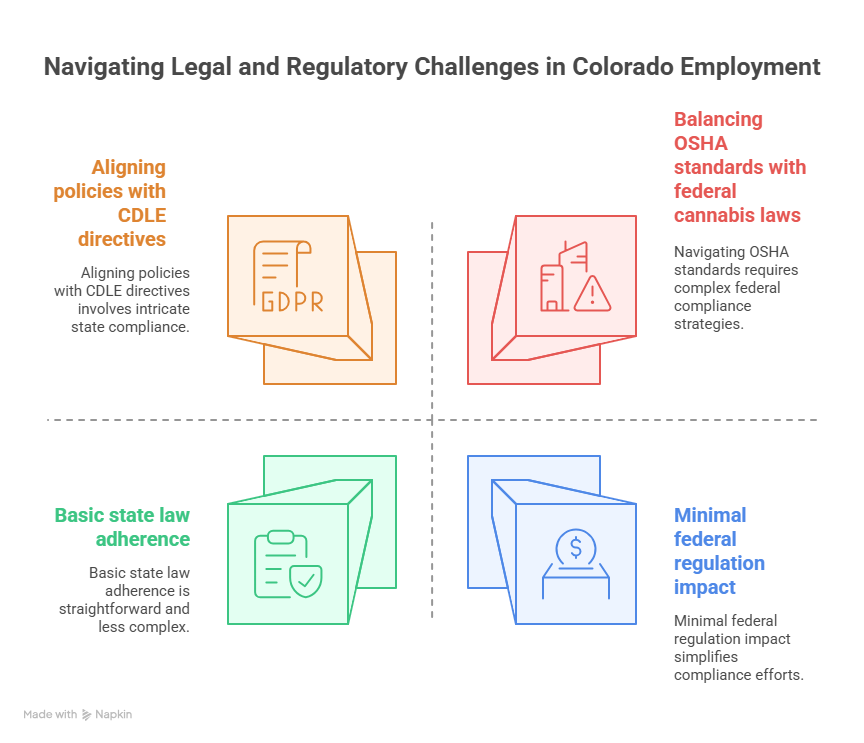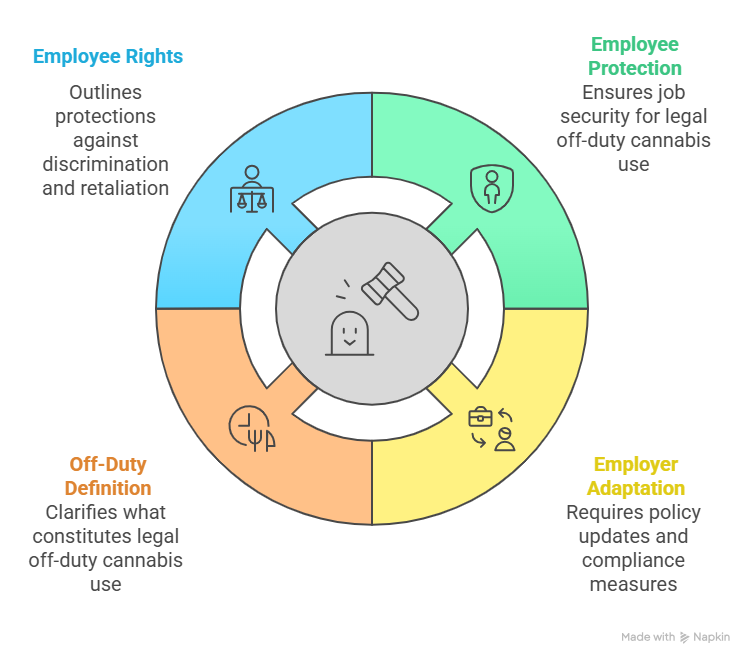In 2023, Colorado set a legal precedent by becoming the first state to safeguard off-duty cannabis use for employees. This shift has significant implications for how businesses manage their workforce. With HB 21-1090, a new legal framework emerged, reshaping employment background checks, drug testing policies, and the balancing act between employee rights and employer responsibilities.
We’ll delve into the core elements of HB 21-1090, offering insights into protections for cannabis use outside of work, exceptions for safety-sensitive roles, and what new workplace policies should look like. If you’re facing uncertainties about legal compliance, policy updates, or enforcing these new rules, this discussion aims to clear the fog.
You can navigate Colorado’s cannabis employment laws with confidence, making informed decisions for your business while respecting employee rights.
Key Takeaways
- Colorado's HB 21-1090 protects employees from being fired for off-duty cannabis use.
- Employers must adjust drug testing policies to comply with HB 21-1090 standards.
- Safety-sensitive roles are exceptions to off-duty cannabis protections in Colorado.
- Legal challenges often arise around determining cannabis impairment at work.
- Future legal changes, including potential federal legalization, may impact current state laws.
Colorado Cannabis Employment Legal Framework
Colorado has taken a pioneering approach to cannabis employment laws. You need to understand the legal bedrock that underpins these changes to navigate things smoothly. Here’s how Colorado's legal framework has evolved.
Labor law can change lives. Discussions of off-the-clock marijuana use are consistent with our values of flexibility and equality. Labor law can change lives. Discussions of off-the-clock marijuana use are consistent with our values of flexibility and equality. We have a responsibility to protect both safety and dignity at work—and that means creating space for legal, off-duty choices that don’t interfere with performance. When we approach this topic with empathy and transparency, we build trust. And trust, in the end, is the foundation of any strong workplace culture.
Legislative Evolution Timeline
The journey of cannabis employment law in Colorado has been a winding road. It began in 2012 with Amendment 64, carving a path for the legal use of recreational cannabis. This signified a critical shift in the legal landscape, marking Colorado as a trailblazer in cannabis legislation.
From 2013 to 2022, employers maintained at-will rights, allowing termination for cannabis use, whether on-duty or off. This environment did little to protect employees engaging in legal off-duty cannabis use, despite the state's progressive stance. However, the landscape transformed in 2021 with the passage of HB 21-1090. This legislation came into effect in 2023, extending legal protection to employees indulging in lawful off-duty cannabis use.
Such legislative decisions underscore a pivotal shift in protecting worker rights while balancing employer needs. As you navigate these evolving laws, consider how these changes might impact your policies, especially if you're in a state-transitioning position. Are your current employment practices aligned with these new legal protections? This timeline isn't just a recount of dates—it's about understanding the growing recognition of employee rights and the need for updated compliance strategies.
Key Legal Authorities

Colorado Revised Statutes § 24-34-402.5 serves as the cornerstone of protecting employee rights concerning off-duty activities. This statute makes it unlawful for an employer to terminate an employee for engaging in legal activities outside of work hours, encompassing lawful cannabis use. The relevance of this statute has grown since HB 21-1090's introduction, effectively reinforcing employees' off-duty cannabis use rights.
The Colorado Department of Labor and Employment (CDLE) plays a crucial role in guiding and enforcing the nuances of these laws. Its directives focus on helping businesses adjust their policies to align with new state requirements. Employers, leaning on CDLE's expertise, can remain compliant and avoid missteps that could lead to legal repercussions.
Federal recognition remains an issue. The Federal Controlled Substances Act lists cannabis as a Schedule I drug, maintaining its illegal status at the federal level. This legal dichotomy between state and federal laws creates ongoing challenges for employers, especially concerning workplaces operating under federal regulations.
OSHA Standards further complicate the landscape by mandating safe working environments, potentially clashing with state protections for off-duty cannabis use. Employers must be vigilant, maintaining safety standards without infringing on protected employee rights. Navigating this dynamic requires a keen understanding of both state and federal obligations, prompting you to balance safety with evolving legal rights properly. Have you evaluated your policies recently to ensure they're in step with these changes?
Why Colorado Led This Change
Colorado's lead in this shift can be linked to a few key factors that reflect both societal and economic currents. Worker rights have gained traction, pushing for increased privacy for legal actions outside the workplace. This is not just about cannabis; it's part of a broader recognition that what you do off the clock is your business, as long as it doesn't affect work performance.
The cannabis industry in Colorado is a $2.2 billion powerhouse. This growth necessitates workforce protection, ensuring employees are not penalized for legal use in their own time. By safeguarding employee rights, Colorado is not only protecting its burgeoning cannabis market but also paving the way for economic stability and growth across sectors. This makes Colorado a more attractive destination for top talent who value personal freedom alongside professional opportunities.
Social reform elements also play a role. By reducing employment barriers for individuals with cannabis use in their background, Colorado is aligning employment laws with a more equitable criminal justice system. It's about giving people a fair chance, recognizing that personal choices around legal cannabis shouldn't derail careers.
Finally, there’s the aspect of staying competitive in attracting talent. Companies need to offer more than just traditional benefits; they need to demonstrate forward-thinking policies that respect personal freedoms. Colorado's move helps businesses stand out in crowded job markets, facilitating hiring and retention. Is your firm's policy up to date for these new realities?
HB 21-1090: Off-Duty Cannabis Protection Law

Core Legal Protections
HB 21-1090 stands as a protective barrier for those who indulge in lawful off-duty cannabis use. This law prevents employers from firing someone solely because they used cannabis legally on their own time. It makes no distinction based on one's role or industry, aside from safety-sensitive exceptions. Employers are also barred from rejecting potential hires simply due to their off-duty cannabis activity. This legislation limits disciplinary actions that relate to off-duty behavior unless an employer can directly link this behavior to on-the-job performance issues.
Retaliation against employees who exercise these rights is also explicitly prohibited by the law. If you speak up about your employer overstepping these boundaries, HB 21-1090 ensures you shouldn’t fear for your job. Understanding these protections can empower you, ensuring that job security isn't threatened by how you choose to spend your personal time within legal limits. Consider how having clarity on these provisions changes your outlook on workplace policy and personal freedoms. Are you aware of your rights under this law?
Law Effective Dates and Implementation
January 1, 2023, set a new precedent as HB 21-1090 took effect, extending legal protection for off-duty cannabis use in Colorado. This change required employers to adapt quickly. By May 2023, the law introduced specific pre-employment drug testing provisions, which affected how businesses screen new hires.
Expect ongoing guidance and enforcement practices from state agencies to shape the landscape. Regulatory agencies will likely provide more direction as they interpret and apply the new legal standards. For now, there's a grace period for businesses to adjust their policies and procedures. Use this time wisely to ensure compliance and avoid future legal issues.
You're advised to review your current drug policies. Are they consistent with the new law? Determine if they require revisions to align with off-duty use protections. This might involve rewriting your employee handbooks or updating training materials to reflect changes.
Think about how your organization will monitor compliance. What systems or processes will you put in place? Consider integrating these updates into your onboarding and HR practices. Implement clear communication methods to educate your workforce on these new rights and obligations.
Ask yourself: Are your managers prepared for these changes? Providing training is necessary. Equip your team with the knowledge to navigate this evolving legal framework. Their understanding will be critical in maintaining compliance and upholding employee rights while balancing workplace safety.
What Constitutes "Off-Duty" Use
Understanding what "off-duty" means is essential for both employers and employees under Colorado's HB 21-1090. At its core, off-duty use is about timing and location. Cannabis consumption must occur outside of work hours to qualify as off-duty. Sounds simple, right? But let's break it down further.
The law specifies that off-duty use happens away from the workplace, which includes company premises, job sites, and while on business travel. So if you're consuming cannabis on your lunch break in the office parking lot, that's not off-duty.
Another critical element is the impairment standard. Employers cannot discipline employees merely for having cannabis in their system. Instead, they must show actual impairment while on the job. This is where documentation becomes crucial. Employers bear the burden of proving that any consumption was on-duty and led to impairment.
It leads to a question: How do you define impairment? The answer isn't always clear-cut and can vary between organizations. Some rely on observed behaviors, while others use more formal testing methods. As an employee, it's wise to understand your company's specific policies. And for employers, clarity in both policy documentations and enforcement is vital.
So, is it enough for employers to witness poor performance to claim on-duty impairment? Not quite. Merely suspecting use isn't sufficient. Observable evidence and adherence to defined procedures are needed. Clear policies and mutual understanding between employers and employees can prevent potential disputes.
Employee Rights Under HB 21-1090
The new Colorado law brings an important shift in your employment rights, especially around off-duty cannabis use. If you enjoy cannabis legally in your own time, this law protects your job. Your employer can't fire you just because you decided to use cannabis away from work. This offers a significant layer of security for your employment status while you engage in legal activities outside work hours.
Equality in the workplace is a core part of these protections. You shouldn't face discrimination in hiring, promotions, or other employment decisions because of your lawful off-duty cannabis use. Your rights in this area aim to ensure that you get treated fairly, regardless of what you do off the clock.
What if your employer oversteps or unlawfully targets you for your off-duty conduct? The law outlines a grievance process to challenge and address any violations of these rights. You're not left without options; you have a structured path to stand up for your rights.
In this evolving legal landscape, knowing your rights helps safeguard your career and personal freedom. Is your employer respecting your right to legal off-duty activities? And are you prepared to exercise your rights if needed? These are questions worth considering as we adapt to these new regulations.
Employer Obligations and Compliance
Navigating the changes brought by HB 21-1090 involves some key steps for employers. First, policy updates are crucial. You'll need to revise drug-free workplace standards to align them with the new regulations. This primarily means incorporating protections for off-duty cannabis use and ensuring these updates are clearly communicated to all employees.
Training requirements can't be ignored. Managers and supervisors should undergo education to understand these emerging standards. This training helps avoid potential legal pitfalls and promotes consistency in handling workplace cannabis issues.
Documentation becomes your friend in this new landscape. It is crucial to maintain comprehensive records to clearly differentiate between off-duty use and on-the-job impairment. Proper documentation strengthens your position if disputes arise.
Finally, a legal review ensures your policies align with both state and federal regulations. Given the ongoing conflicts between state legalization and federal cannabis prohibition, having legal expertise to evaluate your company's policies and practices is indispensable. Are you ready to adapt to these responsibilities?
Safety-Sensitive Position Exemptions
Safety-sensitive positions are special roles where employee performance has direct implications for safety and well-being. Employers in Colorado must carefully navigate how these positions intersect with HB 21-1090, particularly when it involves cannabis use. Here's what you need to know:
Federal Safety-Sensitive Exemptions
Certain roles are exempt from off-duty cannabis protections due to federal regulations. These include jobs under the Department of Transportation, like truck drivers and bus operators, where safety is paramount. The Federal Aviation Administration also regulates pilot and airline staff conduct strictly. Workers in roles governed by the Pipeline and Hazardous Materials Safety Administration, or the Nuclear Regulatory Commission, fall under similar categories. If you're in one of these positions, federal law takes precedence.
State-Defined Safety-Sensitive Positions
Colorado's employment law carves out specific exemptions for safety-sensitive roles. These roles require a higher standard of fitness and alertness due to the inherent risks involved. Policymakers focus on sectors where impairment could lead to severe consequences.
- Law Enforcement: Police officers and corrections personnel take significant responsibility for public safety. The state maintains that any level of impairment can hinder judgment, which is crucial for decision-making in high-stakes situations.
- Healthcare: Frontline roles, including surgeons, emergency responders, and direct patient care providers, fall under this category. In this field, focus and precision are non-negotiable. Even the slightest impairment poses risks to patient safety, making cannabis use outside work hours a sensitive issue.
- Heavy Equipment Operation: Workers operating machinery in construction, mining, or manufacturing face obvious risks. Operating heavy machinery under the influence, even off-hours, can lead to accidents with catastrophic outcomes. Thus, the standard here is strict.
- Child Care: Individuals responsible for the supervision and care of minors, such as teachers and daycare workers, must maintain a safe and secure environment. Slight lapses in alertness due to off-duty use might jeopardize the well-being of children, dictating that this role is protected under the safety-sensitive exemption.
Each of these roles requires a careful balancing act between protecting employee rights and ensuring public safety. Employers are urged to document and justify designations as safety-sensitive, ensuring their criteria can withstand scrutiny should disputes arise.
Employer-Defined Safety-Sensitive Roles
Employers have flexibility to define certain jobs as safety-sensitive, but this requires a thorough risk assessment. Employers need sound documentation to support these claims, and their designations must withstand legal scrutiny. Regularly updating these lists is crucial. Employers must prove that their classification process is sound and consistent. This might mean revisiting roles periodically to ensure they're appropriately designated.
Impairment vs. Off-Duty Use Distinction
Understanding the difference between impairment and off-duty cannabis use is crucial for employers and employees alike. You must navigate this distinction carefully to protect rights and maintain workplace safety.
- Impairment Testing: Identifying impairment isn’t always straightforward. Unlike alcohol, cannabis doesn’t have a universally accepted impairment level. Instead, focus on observable behaviors such as lack of coordination, delayed response, or poor judgment. For instance, if a forklift operator is visibly struggling to handle machinery safely, further investigation might be needed.
- THC Detection Limits: THC, the active compound in cannabis, stays in the body long after its effects wane. Urine tests might show cannabis use days or weeks later, which doesn’t mean the employee was impaired at work. Differentiate metabolites from active intoxication indicators. For accurate assessment, consider tests like saliva or blood that are better suited for determining recent use.
- Reasonable Suspicion: Before testing, ensure there’s reasonable suspicion of impairment. This involves having solid evidence or witness testimony pointing toward possible impairment. Provide training for supervisors to recognize signs and document circumstances that prompt testing. Mismanaging this process can lead to legal challenges.
- Medical Review: Positive test results warrant careful analysis. Engage a medical review officer to evaluate whether there's a legitimate medical explanation unrelated to workplace impairment. This independent review can shield against wrongful accusations and disputes.
Managing these aspects wisely can prevent workplace incidents and support a compliant, productive work environment. Are your current policies equipped to handle these distinctions effectively?
Drug Testing Policy Changes and Limitations
Understanding drug testing policies in light of Colorado's HB 21-1090 calls for a precise approach. With this change, employers in the state need to reconsider how drug testing is implemented and interpreted.
| Category | Key Requirements | Implementation Details |
|---|---|---|
| Pre-Employment Testing Restrictions | Cannot broadly test for cannabis in most job types. Exceptions for safety-sensitive roles (DOT regulations). Must communicate testing requirements upfront | Clearly identify safety-sensitive positions. Provide transparent communication to candidates. Document exempted positions and rationale. Maintain open dialogue with prospective employees |
| Post-Employment Testing Guidelines | Reasonable suspicion standard required. Random testing limited to safety-sensitive positions. Incident-based testing protocols needed. Structured monitoring for returning employees | Document clear, observable signs of impairment. Establish set protocols for incident testing. Create consistency and fairness in application. Implement compliance plans for post-rehabilitation employees |
| Testing Technology & Accuracy | Choose appropriate testing method based on needs. Understand limitations of each testing type. Consider timing and impairment detection goals | Saliva tests: Recent use insight, may not indicate current impairment. Urine tests: Cannot differentiate metabolized remnants from active effects. Blood tests: More intensive but clearer picture of current intoxication level |
| Third-Party Testing Providers | Select competent providers adhering to legal standards. Ensure solid chain of custody procedures. Incorporate Medical Review Officers (MROs) | Verify provider compliance with legal standards. Maintain defensible testing processes. Use MROs for unbiased result interpretation. Ensure policies can withstand legal scrutiny |
| General Compliance | Reconsider existing drug testing implementation. Ensure precise approach to policy changes. Maintain transparency throughout process | Regular policy review and updates. Staff training on new requirements. Documentation of all procedures and decisions. Legal consultation for complex situations |
Workplace Policy Development Guide
For Colorado Employers
Crafting a compliant and effective workplace policy in Colorado requires more than just a quick update. You need a thorough audit of your existing policies. Identify areas that need updates or complete overhauls to align with the HB 21-1090 mandates. Legal compliance isn't a one-and-done process; it’s about consistent alignment with both state and federal laws. This demands regular checks and updates to avoid potential lawsuits or regulatory penalties.
Safety integration is crucial. While protecting employees' rights to off-duty cannabis use, workplace safety cannot be compromised. Ensure your policies maintain a balance, addressing the specifics of safety-sensitive roles and the corresponding justification for any special measures or exemptions.
Communication is the last pillar. Employees must be well-versed in policy changes. A clear, consistent strategy focusing on transparency will promote a better understanding and acceptance of new policies, reducing friction and improving compliance.
Essential Policy Components
Your policy should stand as a firm but flexible guideline that’s easy to understand. Begin with a clear articulation of off-duty protection, stating plainly what employees can expect regarding their cannabis use rights outside of work hours. Define safety-sensitive positions comprehensively—ambiguity can lead to disputes and legal challenges.
Defining impairment standards is key to a fair policy. You’ll need to create specific criteria based on observable behavior and performance impacts. Document the testing procedures thoroughly, detailing when and how tests occur, making sure employees know what to expect.
Implementation Best Practices
Policy implementation goes beyond rolling out changes. Manager training is your first line of defense. Equip your team with the right knowledge of new legalities. Regular training sessions will keep everyone on the same page.
Communicate clearly with employees. Use meetings, newsletters, and digital platforms to spread the word about policy details and implications. Transparency fosters trust.
Documentation is your best friend. Keep precise records to demonstrate policy adherence. This is crucial for both defending your decisions and ensuring everyone complies.
Regular legal review is non-negotiable. Engage legal counsel to routinely assess your policies’ alignment with current laws. This proactive approach will save you significant headaches down the road.
Multi-State Employer Considerations
If your business crosses state lines, harmonize Colorado law with other jurisdictions you operate in. Keep an eye on federal contract requirements, especially if you deal with clients or projects under federal oversight.
Your corporate policy should harmoniously integrate broad company guidelines with state-specific needs. For positions involving travel or remote work, ensure clear jurisdictional applications for policies—the last thing you want is confusion over which rules apply where.
Employee Rights and Protections
Understanding Your Rights
In Colorado, you're protected when you consume cannabis legally during your off-hours. HB 21-1090 shields you from being fired solely for using cannabis when you're not on the clock, giving you the freedom to enjoy legal activities without risking your job. You're also entitled to privacy in relation to cannabis use. Employers can't subject you to random tests unless you're in a safety-sensitive position. If you believe your rights have been breached, a formal grievance can be initiated through your company's HR channel—it's vital to understand this process to defend your rights effectively.
Exercising Rights Responsibly
While you have the right to use cannabis off-duty, it's crucial to ensure it doesn't affect your work performance. Be mindful of how consumption could impact your job. Open communication with your employer can help manage expectations and clarify any concerns about cannabis use. Keep records of any relevant conversations or agreements regarding your cannabis rights. Having documentation can be invaluable if a dispute arises. If things escalate, consulting with a lawyer experienced in employment law can provide guidance on how to proceed with any claims.
Cannabis Use and Career Planning
Consider how your cannabis use aligns with your career path. Different sectors have varying tolerance levels for off-duty use, and understanding these nuances can influence your professional decisions. Maintaining a focus on skill development and networking can help balance your performance with your cannabis use. Highlighting your competencies and contributions at work can alleviate potential employer concerns. In industries more accepting of cannabis, acknowledge how your lifestyle fits in, which might even open up networking opportunities and career growth avenues.
Industry-Specific Applications
Cannabis Industry Employment
Working in the cannabis industry in Colorado comes with specific challenges and requirements. Regulatory compliance is a cornerstone. Employees and stakeholders must adhere to stringent state licensing requirements and comprehensive background evaluations. For example, dispensary staff must undergo a fingerprint-based criminal history record check as part of their licensing process. This ensures only qualified individuals handle cannabis products.
In product testing, accuracy and integrity are vital. Roles in labs and quality assurance focus on ensuring products meet safety and potency standards. Professionals in these positions often have backgrounds in chemistry or biology, emphasizing methodical precision in their work.
Retail operations, encompassing roles like budtenders and customer service representatives, demand a comprehensive understanding of product offerings. These employees must balance offering advice with a keen sense for sales, fostering customer trust and loyalty.
Cultivation is another critical area, involving roles that span from planting to harvest. Employees in growth facility operations must be adept in plant care principles, equipped to manage large-scale commercial production. This often includes familiarity with environmental control systems and pest management strategies.
Employment in the cannabis sector isn't just about product knowledge; it's about adhering to changing legal landscapes. Understanding and implementing these requirements is crucial to fostering a compliant, safe work environment. How prepared are you to meet these expectations as the industry evolves?
Technology and Professional Services
Remote work is reshaping employment landscapes. If you're employing remote workers, consider how cannabis employment laws apply in virtual environments. Even when employees are geographically distant, compliance with Colorado state laws remains essential if your company headquarters or any significant operations are based here. Always confirm which jurisdiction's laws apply for clarity.
In creative industries, like marketing or content creation, flexibility is often valued. This includes accommodating employee lifestyles that may involve legal cannabis use. Employers should ensure policies clearly communicate how off-duty use is treated and align with existing creative freedom. Encourage open dialogue about expectations to avoid misunderstandings.
Consulting firms face unique challenges. They must manage diverse client expectations while adhering to state laws. When consulting across different states, determine how cannabis policies vary and advise clients accordingly. Transparent communication in service agreements can prevent conflicts.
Startups can approach cannabis policy with innovation. Develop clear guidelines that reflect the company's culture. Being proactive in policy development not only safeguards the company legally but can also attract talent in a competitive market. Whether it's establishing progressive policies or maintaining a more traditional stance, clarity is critical. Regularly revisiting policies ensures they remain relevant as the legal environment changes.
Traditional Industries Adapting
In the face of changing cannabis laws, traditional industries like manufacturing, retail, and hospitality must reassess their workplace policies. For manufacturing, safety remains a top priority. Employers need to ensure machines are operated safely and efficiently. This means testing must focus on impairment, not just presence of THC, ensuring workers are fit for duty while respecting their privacy outside work.
In retail, businesses are updating policies to align with these new laws, especially emphasizing communication. Clear updates about when and how cannabis use impacts job performance help maintain customer service standards. Retailers need to balance accommodating staff rights with ensuring a pleasant shopping experience for customers.
The hospitality sector, which thrives on customer interaction and satisfaction, also faces unique challenges. Hotels and restaurants must train staff on the nuances of service while possibly navigating cannabis policies for events and patrons. Addressing these changes head-on requires solid policy frameworks and open lines of dialogue with employees.
Construction sees similar adjustments. Safety takes the front seat, but there's also a need for clarity. Training programs that highlight cannabis policies ensure everyone knows the limits, especially concerning the heavy machinery prevalent in the field. Being proactive helps reduce workplace incidents and keeps productivity on track.
These industries show how adapting to new cannabis laws can work without compromising on safety or service quality. How will your industry address these evolving needs?
Public Sector Employment
Navigating cannabis employment laws in the public sector can be complex. Federal laws, combined with state regulations, create a challenging environment for government jobs. Public sector employees, such as those working for federal agencies, must adhere strictly to federal regulations, which still classify cannabis as illegal. This can lead to confusion for employees working under state jurisdiction.
School districts have to balance statewide protections with federal funding requirements. Teachers and staff may face strict policies due to the Drug-Free Workplace Act, which makes cannabis use, even off-duty, a tricky area to maneuver. School districts often implement broad policies to ensure compliance, sometimes extending beyond state law.
Municipal employees, operating under city and county laws, have more leeway than federal workers. However, the challenge remains in aligning diverse agency policies with state law without overstepping federal boundaries. City policies may vary, so understanding local regulations is vital.
For contract workers, the issue is twofold: aligning with both the government agency's and the contracting company's policies. Agencies might impose stricter regulations, even if the contracting company operates under more lenient rules. Knowing where these lines intersect helps to minimize contract disputes and ensures a smooth operation within the public sector.
Enforcement and Legal Challenges
Colorado Department of Labor Enforcement
You can initiate a complaint with the Colorado Department of Labor and Employment (CDLE) if you suspect a violation of HB 21-1090. This process begins with submitting a detailed complaint outlining the employer's alleged non-compliance. The department investigates and, if a breach is found, enforces penalties or mandates corrective actions. Employers found in violation may face fines or mandated policy revisions to align with state laws. Compliance resources, such as guidance documents from the CDLE, can help employers understand and meet obligations. As the law is relatively new, enforcement practices are still evolving, emphasizing the need for businesses to stay informed and compliant.
Common Legal Challenges
Determining impairment remains a challenge. Employers must differentiate between off-duty use and workplace impairment. Disputes often arise in safety-sensitive roles, where classification may be contested. For example, an employee could challenge whether their position genuinely demands heightened safety standards. Conflicts between state and federal laws also present hurdles, especially in workplaces bound by federal compliance. Wrongful termination claims are another critical area, and resources like legal consultation can help employees navigate these disputes.
Litigation Trends and Precedents
Initial cases post-HB 21-1090 offer early insights into legal interpretations. These cases shape how courts view the balance between employer policies and employee rights. Settlements often arise as businesses seek to avoid protracted legal battles, helping refine practices and policies. Developing a legal strategy is crucial. Employers and employees alike should focus on building cases with stability in precedent, as court interpretations evolve with each ruling. By watching these trends, companies can better align their policies with judicial expectations.
Practical Implementation Challenges
Employer Compliance Difficulties
Keeping up with Colorado's cannabis employment laws isn't simple. Employers often face challenges updating workplace policies to comply with HB 21-1090. Outdated rules can lead to legal vulnerabilities. Rewriting policies is crucial to protect against potential claims. Consider the cost of training managers on these new rules. Educating leadership on compliance isn't just a one-time investment; it's an ongoing need.
Choosing the right drug testing provider is another hurdle. The new law requires specific compliance standards, especially when testing for cannabis. Employers must ensure that their selected vendor meets legal requirements. THC detection techniques vary, and incorrect testing can lead to disputes.
Insurance implications also play a role in employer challenges. Workers' compensation policies might shift due to cannabis protections. Employers may need to reassess coverage and ensure that policies account for cannabis use, particularly with off-duty use protection in place.
Employee Education Needs
Employees also need to understand their rights and responsibilities under the new law. While off-duty cannabis use is protected, remaining aware of workplace performance impacts is essential. Employees should be informed about how cannabis use could affect their job, especially in safety-sensitive roles.
Documenting interactions and maintaining clear records can help clarify situations and protect personal rights. Encourage staff to keep accurate accounts of discussions about cannabis use and work performance. This practice helps resolve conflicts and supports employees if disputes arise.
Professional development should not take a backseat to cannabis use. Employees need guidance balancing consumption with career ambitions. This balance is key to ensuring that professional growth isn't hindered by new rights.
Industry-Wide Adaptation
Different sectors face unique challenges adapting to these changes. Industry-specific best practices must be developed and shared. Collaboration with trade associations can aid in setting standards that align with legal requirements. These organizations often provide resources and guidance for adapting to new laws.
Technology can be a helpful ally in managing compliance. Leveraging software for tracking policy adherence and documenting employee interactions can simplify the process. Tech solutions may offer competitive advantages by easing transition and ensuring continued compliance.
By embracing a forward-thinking mindset, businesses can turn compliant cannabis policies into a competitive edge. Candidates often look for employers who are progressive and adaptable. Companies that lead with clear, fair cannabis-related policies not only attract top talent but also foster a supportive work environment. This approach, when managed correctly, aligns operational safety with employee rights, promoting a healthy, productive workplace.
Future Trends and Legal Evolution
Potential Legislative Changes
Federal cannabis legalization could dramatically alter Colorado’s employment law landscape. If cannabis is legalized federally, Colorado employers would face a new layer of regulation. Consider how current state protections might expand or contract in response. Will additional protections be introduced to cover new aspects of off-duty use, or could federal laws override existing protections? The ripple effect on multi-state employers operating in Colorado is significant. You might have to align company policies with both state and federal laws, adding complexity to compliance.
The possibility of new state protections is on the horizon. What further rights could be extended to employees? Expanding employee protections can increase job security, but ensure that your policies align with the evolving legal environment. Watch for potential legislative sessions addressing these expansions, as they may influence your approach to employee rights management.
Interstate commerce and employment laws add another layer to consider. How do you harmonize policies across state lines where cannabis laws differ substantially? Multi-state employers must be vigilant about maintaining compliance with disparate legal systems. Anticipate legal challenges and be ready to adjust policies as required.
Industry-specific regulations may also emerge as sectors continue to adapt to cannabis employment laws. Industries like healthcare and transportation might see refined regulations tailored to their unique operational risks and needs. Stay informed about any updates that could affect sector-specific compliance requirements. How will these changes shape your operational policies and safety protocols?
Keeping an eye on these areas will prepare you for the future of cannabis employment law. Adapting to legislative shifts ensures that your business remains compliant and competitive.
Workplace Innovation
As cannabis regulations evolve, so too does the workplace landscape. Companies are beginning to explore new technologies to assess impairment. Mouth swabs and breath tests are making strides, offering alternatives to traditional urine tests, which often don't distinguish between recent and past use.
Remote work policies face unique challenges too. The line between personal time and work hours blurs at home. How do you enforce off-duty use policies when the workplace is your living room? Clear guidelines and transparent communication are key.
Wellness programs might incorporate cannabis-related health options. If cannabis is legal, should employee benefits include cannabis products? Organizations must weigh the risks and embrace thoughtful integration.
In performance management, the focus is shifting. Results, not hours spent at a desk, are what matter. Can someone deliver while using cannabis responsibly off-duty? If the work gets done, do old perceptions still apply? Cannabis discussions prompt rethinking how performance impacts are assessed.
The balance between innovation and regulation will drive the future of cannabis in the workplace. The question for employers and employees: Are you ready to adapt?
National Influence
Colorado’s landmark legislation on cannabis employment rights could set a significant precedent for other states considering similar reforms. As states observe Colorado's approach to balancing employee rights with workplace safety, they might draw from these legal frameworks to develop their own cannabis employment policies. States such as California, Washington, and Oregon, which have a history of progressive cannabis laws, may use Colorado’s policies as a blueprint for their legislative efforts. Watching how these states adopt and modify Colorado's approach could provide insights into future trends.
Federal policy changes are also on the horizon. If federal cannabis legalization progresses, state laws like Colorado's might serve as a basis for crafting new national standards. This shift could unify laws across states, reducing the complexity faced by multi-state employers. As federal laws evolve, how states like Colorado have handled cannabis-related employment issues could influence the crafting of coherent, nationwide regulations.
Companies operating nationwide need to stay ahead of such changes. By aligning corporate policies with progressive state laws, organizations can enhance compliance and minimize legal risks. Large corporations might look to Colorado's legislative experience to revise their internal policies, anticipating future national legal trends. Aligning HR practices with evolving laws ensures compliance, fosters a fair workplace, and maintains competitive advantage.
Legal precedents emerging from Colorado can also provide guidance to other jurisdictions. As courts interpret HB 21-1090, these decisions could influence how similar cases are approached elsewhere. Observing how various legal challenges unfold and are resolved in Colorado will be crucial for understanding potential outcomes in other states with similar legislative aspirations.
Colorado Cannabis Employment Landscape
Colorado's cannabis employment laws are reshaping how work, rights, and responsibilities intersect. HB 21-1090 stands at the forefront, securing legal protection for off-duty cannabis use. This grounds a major shift, compelling both employers and employees to re-evaluate their boundaries. The challenge lies in balancing these rights with workplace safety standards, a delicate act requiring transparency and legal literacy.
For employers, understanding the implications of HB 21-1090 is key. A fundamental takeaway: you can't penalize employees for legally using cannabis off the clock. However, safety-sensitive positions maintain exemptions. Consider this balance: promoting safety while respecting personal liberties can improve company culture and employee satisfaction.
Adapting to these changes is a continuous journey. Legal landscapes aren't static. This means staying informed and updating workplace policies accordingly. Seek advice from legal and HR professionals to remain current and compliant. Remember, the goal is not just compliance but fostering a fair and safe workplace environment for all.
As legal shifts continue, embrace resources available through legal experts and trade organizations. Engaging with these can offer insights that guide smooth transitions. In essence, the Colorado cannabis employment framework prompts a thoughtful dialogue on worker freedoms and employer duties. Engage with it responsively to ensure your workplace aligns with modern standards.
Frequently Asked Questions
Do you have questions about background checks and working in Colorado? You are not alone. Whether for new job prospects, for participation in the cannabis industry, or for concern regarding your rights, understanding procedures involved with background checks at the state level matters. These subsequent FAQs clarify the basics in simple language—so that you can advance with confidence and knowledgeable insight.
Does Colorado do background checks for employment?
Yes, employers in Colorado often conduct background checks as part of the hiring process. This can include checking criminal history, employment history, and education credentials.
What do you need to work in the cannabis industry in Colorado?
You need a state-issued badge from the Colorado Marijuana Enforcement Division. This involves a background check and meeting age and residency requirements.
How far back can an employer do a background check in Colorado?
Employers typically look back seven years for criminal history unless the job is highly sensitive or involves significant financial responsibility.
Can a felon work at a dispensary in Colorado?
Generally, individuals with certain felony convictions in the past three years may not be eligible for employment in the cannabis industry, according to state regulations.
Who is eligible for rehire in Colorado?
Rehire eligibility depends on the policies of the specific employer. Past performance, conduct, and the reason for departure can affect this.
Are there specific disqualifications for working in Colorado dispensaries?
Yes, beyond criminal history, issues like failing a drug test or falsifying application information can be disqualifying.
Is drug testing mandatory for employment in Colorado?
This depends on the employer’s policy. Many companies, especially in regulated industries, require pre-employment and random drug tests.
Do employers in Colorado have to provide a copy of the background check?
Under the Fair Credit Reporting Act, if an employer uses a third party to conduct the check, they must provide a copy if it played a part in not hiring the applicant.
How can you contest errors in a background check in Colorado?
You can dispute any inaccuracies with the company that provided the report. Review your report carefully to ensure all information is correct.
What rights do you have regarding background checks in Colorado?
You must be informed if a background check is being conducted, and you have the right to consent or decline, although declining might affect employment chance.
Additional References
- ColoradoCannabis.org: Colorado Marijuana Laws 2025
- Colorado General Assembly: HB 21-1090 Bill Text
- Colorado Supreme Court: Coats v. Dish Network (Employee Marijuana Use)
- University of Denver Korbel School: Employment and Marijuana in CO

GCheck Editorial Team
Meet the GCheck Editorial Team, your trusted source for insightful and up-to-date information in the world of employment background checks. Committed to delivering the latest trends, best practices, and industry insights, our team is dedicated to keeping you informed.
With a passion for ensuring accuracy, compliance, and efficiency in background screening, we are your go-to experts in the field. Stay tuned for our comprehensive articles, guides, and analysis, designed to empower businesses and individuals with the knowledge they need to make informed decisions.
At GCheck, we're here to guide you through the complexities of background checks, every step of the way.






